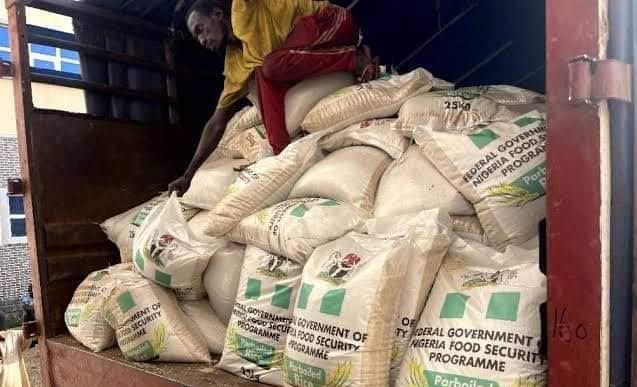
It was a task for residents of Abuja to purchase the federal government-approved subsidized rice at N40,000 per 50kg bag to cushion the high prices of the staple.
Findings by the Guardian show that there is not much information on points of sale to purchase the staple, even though many residents were eager to buy, given the price of Nigerian rice that has climbed up to N90,000 in the market.
When the programme commenced last Thursday, the Director, Strategic Grains Reserve Engr Haruna Sule, said there would be a point of sale at the Headquarters of the Federal Ministry of Agriculture and Food Security and some other parts of the FCT.
He maintained that they plan to move the point of sales from one place to the other to ensure everyone’s benefit. He was not however specific on places residents can buy the staple.
When the Guardian reached out to the Director, he said that currently, they have five points of sale at the Federal Ministry of Agriculture, Federal Capital Territory (FCTA), Head of Service, office of the Economic Financial Crimes Commission (EFCC), and the Independent, Independent Corrupt Practices Commission (ICPC) office.
He said they were working to ensure the bags of rice were not hijacked by hoodlums, hence, the point of sale differs from the collection point.
Meanwhile, when the Guardian visited the point of sale at the Federal Ministry of Agriculture, a long queue of people, mostly civil servants were observed as they tirelessly waited for their turn to purchase the rice.
To purchase the rice, the intending buyer must present the National Identity Number slip and phone number to the officers at the point of sale, who then enter his details on their system, after which a paper is given to proceed to the pay point, a code is generated with which the buyer can take to the collection point to pick up the rice.
Many of them complained that they had been in the queue since morning. It was learnt that the officers only attended to a few people since the sales commenced by 9:00 am.
The reason, from observation, is that there is only one computer system available to enter the details of hundreds of people in the queue.
A civil servant who identified as Mr Adekunle expressed his frustration over the slow process, said “I leave in Masala, I had to come very early as 6:30 am to the office so that I can buy the rice, it’s 1:00 pm already and am still on the queue.
“I wonder why the government makes things so difficult for Nigerians in the name of ensuring transparency. There are better and faster ways of doing things like this.”
Meanwhile, some Civil Society Organisations have begun to criticize the cumbersome processes of purchasing subsidized rice.
The Executive Director of the African Network for Environment and Economic Justice (ANEEJ) David Ugolo applauded the government’s effort in tackling high food prices.
He said “Ordinarily, once the government announces a programme, citizens should be able to get the rice at designated shops to make purchases with ease. If you take an example from the time fuel was cheap in the country, marketers were smuggling the product to neighbouring countries to sell.
“Why do you think the sale of rice will be different? Any measure to ensure that the rice gets to the intended persons is welcomed. In the long term, the government should evolve workable policies to reduce the hardship Nigerians are currently facing.”
Ugolo, however, advocated the need for decentralized distribution centres, by establishing centres across the country, especially in rural and remote areas to reduce travel burdens on the poorest households in an attempt to purchase the commodity.






